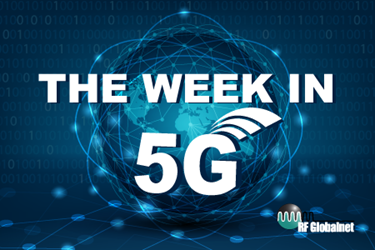The Week in 5G: 9/23/21 — DoD Picks Viasat for 5G, T-Mobile Urges FCC To Begin Next Auction

By Abby Proch, former editor

The Department of Defense has awarded two contracts to Viasat for improving Command and Control (C2) applications and for deploying a 5G-enhanced network for Agile Combat Employment (ACE). In the first contract, Viasat will provide C2 hardware packages and network and cybersecurity software, according to a company press release. Plus, it will explore how its 5G services can provide on-demand cloud access from the battlefield, share real-time data for situational awareness, and support high-bandwidth operations.
In the second contract, Viasat agreed to provide quick, secure deployment of 5G in the battlefield, with a focus on organizing and optimizing network planning and performance, as well as keeping enemy forces from interfering with or intercepting data from the network.
In other military news, AT&T and the Naval Postgraduate School (NPS) are exploring 5G and edge computing-based maritime solutions for use in unmanned aerial, surface, and underwater robotics vehicles. According to an AT&T press release, the two are embarking on a collaborative research and development agreement, or CRADA, over the next three years. The experiments will happen a the NPS Sea Land Air Military Research (SLAMR) laboratory near Monterrey, California.
In spectrum auction news, T-Mobile is urging the Federal Communications Commission (FCC) to speed up plans for its next 2.5 GHz band auction. In a Sept. 15 letter, T-Mobile expressed urgency at scheduling the spectrum auction so it can press forward with providing 5G services. T-Mobile also decried what it says is AT&T’s attempt to further delay the auction and change the simultaneous multiple round (SMR) format to a pay-as-bid (PAB-SRSB) pricing structure. T-Mobile also contended that AT&T simply wants access to “competitively sensitive information.”
According to T-Mobile, AT&T says that a SMR auction enables price discovery and that is “an ‘enormous advantage’ because it would enable T-Mobile, which has ‘strong incentives’ to fill out its nationwide footprint with 2.5 GHz band spectrum.” T-Mobile argues that it acts” just the opposite” and is an “economically rational bidder.”
In India, the Union Cabinet approved a telecom relief package that eliminates the Spectrum Usage Charge (SUC) for future auctions, puts a four-year pause on statutory dues, and allows companies to share airwaves, among other things. The relief package comes as a boon to operators like Vodafone Idea who are past-due and could benefit from the time to “shape up,” according to news report from Business Standard. The next spectrum auction will most likely happen in January or February.
In Portugal, an exceptionally sluggish spectrum auction might be getting a boost, according to Telecoms.com. More than 175 days into the auction, the regulator, Anacom, is increasing the minimum bidding increment for each spectrum lot from 1% and 3% increments to 5%. Anacom is hoping the increase will speed along the auction, which has demonstrated a “very low level of excess demand,” it said. According to the report, at day 175, the auction had totaled $431.9 million – less than $58.6 million more than the total on day 99. Anacom says if the auction doesn’t pick up momentum, it could lead to delays in deployment as well.
In Brazil, spectrum regulator Anatel is pushing its planned October spectrum auction into November. According to RCR Wireless, Anatel director Moisés Queiroz Moreira said the agency needs to continue a discussion on an exclusive government network and a fiber optics network that would bring broadband services to the Amazon region.
Also in Brazil, Vivo and Nokia announced the start of its 5G trials on the 26 GHz band. The two aim to identify which services would be best suited for the band, according to the same report. Vivo is the third carrier in Brazil to begin rollouts. TIM and Claro have already launched limited 5G services through Dynamic Spectrum Sharing (DSS) technology.
In other rollout news, Nokia and Indosat Ooredoo have launched commercial 5G services in Surabaya city, Indonesia, according to a Nokia press release. The two partners, along with Sepuluh Nopember Institute of Technology and the University of Oulu, are also creating a Nokia 5G Experience Centre in the city. The center will house a Centre of Creativity for university students and tech developers to “explore and develop new 5G use cases to drive innovation and socio-economic development in Indonesia.”
In more remote parts of the country, Ceragon will provide 5G services. Ceragon’s all-outdoor network, on its IP-20 platform, is said to provide construction savings because of its “small footprint and minimum power consumption.” Plus, its Advanced Space Diversity (ASD) solution will optimize tower load and call for fewer total antennas, according to a MENAFN news report.
To the north, Bhutan Telecom has picked Ericsson to roll out its 5G network and services, according to The Economic Times. The first deployment will be 5G Non-Standalone (including Ericsson Radio System products and solutions such as Ericsson Spectrum Sharing, Packet Core upgrade, OSS/BSS 5G enhancements), followed by 5G Standalone.
